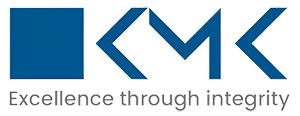Why Accurate Bank Reconciliation is Critical for Financial Reporting

Introduction
Accurate financial reporting is the foundation of strategic business success. It informs stakeholders, supports regulatory compliance, and serves as a key decision-making tool for business leaders. While many organizations focus on financial statements, audits, and forecasting models, one critical behind-the-scenes process often gets overlooked—bank reconciliation. This essential accounting practice ensures that all financial records match external bank statements, validating the integrity of a company’s cash flow and financial health.
At KMK, we partner with businesses to strengthen their financial reporting and internal controls through our professional bank reconciliation services. Regardless of size or industry, organizations that invest in accurate reconciliation benefit from enhanced financial accuracy, stronger audit preparation, and the confidence of key stakeholders. In this blog, we’ll explore why bank reconciliation is a vital pillar of reliable financial reporting and long-term financial success.
Ensures Reliable Financial Statements
Financial statements, such as balance sheets and cash flow reports, are only as accurate as the data they are based on. Without proper reconciliation, accounting records can easily diverge from reality due to various discrepancies.
Eliminating Discrepancies and Errors
When companies fail to reconcile their internal records with bank statements regularly, issues like unrecorded deposits, missing transactions, or duplicate entries go unnoticed.
Common discrepancies include:
- Bank fees or charges not reflected in accounting systems.
- Timing differences between payments and bank postings.
- Human errors in data entry.
By addressing these issues through regular reconciliation, businesses maintain accurate financial records that provide a clear picture of cash flow, liquidity, and financial standing.
Related Blog: Common Bank Reconciliation Errors and How to Fix Them
Enabling Consistency Across Financial Reports
Financial statements must be consistent across periods to identify trends and evaluate performance. Bank reconciliation ensures that historical financial data is correct and aligns with actual bank activity, leading to trustworthy reports month after month.
Accurate bank reconciliation ensures:
- Integrity in balance sheets and income statements.
- Consistent and reliable data for financial modeling.
- A firm foundation for performance analysis and projections.
Supports Compliance and Audit Readiness
Businesses operate in a landscape defined by stringent regulatory standards. Regulatory bodies and auditors require businesses to maintain precise financial records, and bank reconciliation plays a critical role in meeting these expectations.
Meeting Financial and Industry Regulations
Companies subject to regulatory frameworks such as GAAP, SOX, IFRS, or industry-specific compliance standards must maintain financial transparency.
Bank reconciliation contributes by:
- Ensuring transactions are authorized, documented, and traceable.
- Maintaining audit-ready records that align with regulatory requirements.
- Preventing financial misstatements that could lead to regulatory penalties or fines.
Streamlining Audit Processes
Auditors closely examine reconciled accounts to verify the accuracy of financial statements. Regular and well-documented reconciliation simplifies audits, minimizes the risk of audit findings, and shortens the overall review process.
Additional audit benefits include:
- Providing auditors with a detailed trail of reconciled discrepancies.
- Demonstrating internal control effectiveness.
- Reducing audit costs due to fewer errors and smoother processes.
Businesses that prioritize reconciliation show regulators, auditors, and financial partners that they are committed to responsible financial management.
Improves Decision-Making and Stakeholder Confidence
Bank reconciliation isn’t just about compliance—it’s also key to improving financial strategy and stakeholder relations.
Empowering Strategic Financial Decisions
Business leaders require reliable financial information to make informed decisions on spending, investment, and operational improvements. When financial statements are backed by thoroughly reconciled accounts, companies can:
- Optimize resource allocation.
- Improve working capital management.
- Plan for both short-term cash needs and long-term growth.
Having real-time visibility into reconciled accounts allows management to respond to changing market conditions with agility and confidence.
Strengthening Stakeholder Trust and Credibility
Lenders, investors, and board members rely on accurate financial data to assess business performance and risk. Reports that stem from unverified or error-prone accounts can damage credibility and erode trust.
Benefits for stakeholders include:
- Increased confidence in financial statements.
- Enhanced ability to secure financing and investment.
- Transparency that supports strategic partnerships and investor relations.
By producing reconciled and accurate financial reports, businesses can foster stronger relationships with key stakeholders and position themselves for sustainable growth.
Facilitating Fraud Prevention and Risk Mitigation
Inaccurate or unreconciled accounts can expose businesses to internal fraud and operational risk. A robust reconciliation process serves as a crucial fraud prevention tool.
Key risk management benefits include:
- Early detection of unauthorized transactions or discrepancies.
- Timely resolution of errors before they escalate.
- Establishing clear internal controls that deter fraudulent activity.
With tighter oversight and reconciled records, businesses can minimize the likelihood of financial losses due to fraud or mismanagement.
Read also: The Role of Bank Reconciliation in Fraud Prevention and Risk Management
How KMK Can Help
At KMK, we provide comprehensive outsourced bank reconciliation services to help businesses ensure financial accuracy and compliance. Our reconciliation experts combine deep accounting knowledge with advanced cloud-based accounting platforms to automate and streamline the reconciliation process.
By partnering with KMK, your business will benefit from:
- Early detection and correction of financial discrepancies.
- Accurate and audit-ready financial statements.
- Streamlined workflows and reduced manual effort.
- Greater peace of mind knowing your financial reports are reliable and fully reconciled.
Our team offers tailored reconciliation services that align with your business’s unique needs, helping you maintain financial clarity and meet reporting deadlines with confidence.
Conclusion
In today’s increasingly regulated and competitive environment, accurate bank reconciliation is indispensable for businesses striving to maintain financial integrity. From enhancing the reliability of financial statements to streamlining audits and reinforcing stakeholder trust, reconciliation is a critical part of any organization’s financial strategy.
At KMK, we empower businesses to achieve excellence in financial reporting through expert reconciliation services that reduce errors, prevent fraud, and ensure compliance. Let us help you improve your reporting processes and protect your business from financial risks.
Contact KMK today to discover how we can support your financial success through accurate and efficient bank reconciliation services.
About the Author
Bert Wilson serves as our U.S. representative and client success manager, specializing in U.S. tax and accounting services. With expertise in tax compliance, financial reporting, and outsourced accounting solutions, Bert helps clients navigate complex financial challenges. Holding a Master’s degree in accounting and having obtained his C.P.A. license from the state of Colorado, he ensures client expectations are exceeded through tailored solutions and seamless collaboration with our India team. Passionate about building relationships, Bert enjoys both early mornings and outdoor sports, embodying a proactive approach to success
serves as our U.S. representative and client success manager, specializing in U.S. tax and accounting services. With expertise in tax compliance, financial reporting, and outsourced accounting solutions, Bert helps clients navigate complex financial challenges. Holding a Master’s degree in accounting and having obtained his C.P.A. license from the state of Colorado, he ensures client expectations are exceeded through tailored solutions and seamless collaboration with our India team. Passionate about building relationships, Bert enjoys both early mornings and outdoor sports, embodying a proactive approach to success
Let’s Take Our Conversation Ahead
KMK is a top outsourced accounting and tax service provider. We offer end-to-end accounting and tax services for small to mid-sized businesses, with a team of 875+ professionals, including certified public, chartered, and staff accountants.
USA:
651 N Broad St Suite 205, Middletown, DE 19709, USA
Phone: 310-362-2511
India:
300, Sankalp Square-3B
Sindhu Bhavan Marg,
Ahmedabad, Gujarat 380058
For Career: 91-98240-42996
Developed by Bluele | Copyright © 2026 | KMK Ventures Private Limited. | All Rights Reserved


